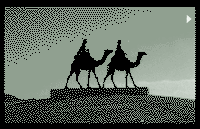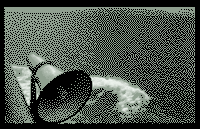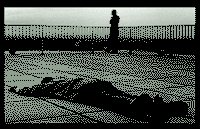June 27, 2008
2007 Ethnic violence in Vanuatu
Almost 200 people have been arrested in Vanuatu after tribal violence flared amid claims of black magic.
Three people have been killed in the South Pacific island nation.
A state of emergency has been declared after fighting broke out at the Blacksands squatter camp on the outskirts of the capital, Port Vila.
The fighting – sparked by accusations that a sorcerer had used witchcraft to kill a rival – escalated rapidly and spread through the settlement.
Blacksands is home to thousands of people who have migrated to the capital from other parts of Vanuatu.
Villagers from the islands of Ambrym and Tanna fought with machetes and knives. Local police said the ethnic violence was the worst the Melanesian nation had ever seen.
It left three men dead and others seriously hurt. Dozens of people have been arrested, including a number of tribal chiefs.
A state of emergency has been imposed and public meetings have been banned for the next two weeks.
The country’s unarmed police officers have been given special permission to carry weapons just in case there is more trouble.
Many residents across Vanuatu’s archipelago have been forbidden from travelling to Efate, the main island where Port Vila is located.
Although Christianity has strong roots in this corner of the South Pacific, witchcraft and superstition remain powerful forces.
On the island of Tanna villagers worship a mystical American called John Frum, while others believe that the husband of Britain’s Queen Elizabeth II is a god. Vanuatu’s Great Council of Chiefs is expected to meet next week to look at ways to defuse tensions between rival tribes in Port Vila.
Kastom
One of the many unique aspects of kastom is the bulu scar. Believing they are vulnerable to an attack from a devil while walking alone through the forest, the people from this highland tribe of Vanuatu go to painful measures to do what they believe will protect them. Taking a burnt thorn from a sago palm, they push it into their flesh and then set it on fire. It sears the flesh, festers, and then forms a scab which will heal into a bulu scar. They do this because they believe that by enduring this pain they arouse the compassion of a powerful spirit they call Taute, and in turn Taute empowers the bulu to ward off evil spirits and damate (ancestral ghosts) when they travel through the jungle.
A boy receives his first bulu when he is five to seven years old. At that time, a minimum of five holes are burnt into the flesh of his biceps and as many as thirty if he can endure the pain. Since they believe a protective spirit enters each wound, they feel the more the better. After receiving their bulus, the boys are lowered into a pit where they live in isolation for ten days surviving only on wild yams that have been cooked in bamboo. During these ten days the boys are forbidden to leave the pit for any reason. This period of isolation is believed to be a form of rebirth and spiritual growth.
June 19, 2008
Coin Shortage, Tooth Surplus for Solomon Islands
Yes, yet another nation is reporting a coinage shortage, this time it being the Solomon Islands in the South Pacific Ocean region. The difference between this shortage and shortages in other such places as India and China is that primitive money items traditionally used in barter may become a handy backup in the Solomons.
The Central Bank of Solomon Islands has called on citizens of the island nation to cash in their coins. Both the Australian Broadcasting Corporation and Radio New Zealand International reported May 1 that Solomon Island businesses and local merchants were simply running out of coins to use in commerce.
Part of the problem, according to the ABC, is that “The low value of coins in Solomon Islands’ currency has led many there to either hoard them, or to give them as gifts to children.” RNZ added, “However, the number of people doing this is starting to affect businesses.”
Denton Rarawa is the acting governor of the Central Bank of Solomon Islands. He was recently quoted by both sources as saying, “When coins don’t come back into the system we have to continuously mint new coins,” adding, “The bank has now begun a public appeal asking Solomon Islanders to cash in their coins for [bank] notes.”
So, what do you do if you live or work in this South Pacific archipelago and run out of coins to use in commerce? According to an April 30 Wall Street Journal article by Yaroslav Trofimov, you do business the old fashion way. You use dolphin teeth.
Have any doubts about if dolphin teeth, wild dog teeth, tapa cloth, feathers of specific exotic and likely endangered species of birds, or any of a number of other things that were at one time used as what in numismatics is usually dubbed “odd and curious money?” Ask the International Primitive Money Society. To put in a shameless plug for the IPMS, the organization can be contacted at 2471 SW 37 St., Ocala, Fla. 34474 or through Charles Opitz at opitzc@aol.com. The IPMS meets at the annual American Numismatic Association convention. It will hold its next meeting in Baltimore Aug. 1 at 4 p.m. in Room 318. The IPMS publishes a newsletter twice a year containing original articles on primitive money and offers free ads to members.
Getting back to Trofimov’s Wall Street Journal article, the author states: “Over the past year one spinner tooth has soared in price to about two Solomon Islands dollars (26 U.S. cents), from as little as 50 Solomon Islands cents. The official currency, pegged to a global currency basket dominated by the U.S. dollar, has remained relatively stable in the period.”
Apparently dolphin teeth must be all the rage in the islands. Central Bank of the Solomon Islands Governor Rick Houenipwela is described in the article as an investor in dolphin teeth, purchasing what is described as a “huge amount” a few years ago.
Houenipwela is quoted in the article as saying, “Dolphin teeth are like gold. You keep them as a store of wealth – just as if you’d put money in a bank.” It doesn’t sound as if Houenipwela’s commodity position will encourage people to want to put Solomon Island coins back into circulation.
Houenipwela has had his chance to literally put his dolphin teeth into the bank. Some time ago he was approached by local Solomon Island businessmen who wanted to establish a bank in which dolphin teeth could be deposited. Houenipwela declined the request not because he didn’t think it was a good idea, but because only conventional currency can be deposited in banks under Solomon Islands law.
According to the Trofimov article, “Hundreds of animals are killed at a time in regular hunts, usually off the large island of Malaita. Dolphin flesh provides protein for the villagers. The teeth are used like cash to buy local produce. Fifty teeth will purchase a pig; a handful are enough for some yams and cassava.”
According to Trofimov, the ancient native tradition of purchasing the bride with dolphin teeth is alive and well, also encouraging the use of odd and primitive money over that of metal coins. The Wall Street Journal article identifies one individual as needing 5,000 teeth for an upcoming double wedding of his two sons. This individual ordered the teeth through someone at a hunting village in Malaita.
The natives aren’t particularly humane about how they harvest the dolphin teeth, according to Trofimov. The natives still use the traditional method of nearly suffocating the dolphin, then cutting off its head with a machete.
One individual who sells dolphin teeth was quoted in the Wall Street Journal article as saying, “The white man’s money will end, but the dolphin teeth will always be there for us.” It would appear the Central Bank of Solomon Islands may have a challenging time getting people to put metal coins rather than dolphin teeth back into circulation.
June 16, 2008
Thailand’s ousted premier says realignment of stars in early July will ease political tension
Ousted Thai Prime Minister Thaksin Shinawatra, a firm believer in astrology, said Monday the realignment of stars in early July will help defuse political tension that has been building as anti-government protests enter a fourth week.
Thailand’s discord heightened Monday after two small bombs exploded in Bangkok, though no one was injured, and the anti-government People’s Alliance for Democracy tied up traffic for hours in the latest protest against the current government.
«Be patient with the headache-inducing situation until July 2,» Thaksin told reporters. «Mars moving close to Saturn causes the headache. When Mars leaves, the situation will ease.
Thailand is a moderning, Buddhist nation, but fortunetellers and superstition play a major role in society, even among the Western-educated elite. Political decisions in the past have been known to be influenced by fortunetellers’ advice.
Before Thaksin was toppled in a 2006 military coup, respected astrologer and Senator Boonlert Pairintra predicted Thaksin’s downfall, saying that the planet Mercury used to favor the prime minister but was later eclipsed by the God of Darkness.
Thailand’s latest political tension revolves around Thaksin, who returned from exile earlier this year to face corruption charges against him now that a new elected government has taken office.
Demonstrators have been holding sometimes-violent protests since May 25 to demand the resignation of Prime Minister Samak Sundaravej and his coalition government. The protesters say Samak is a puppet of Thaksin.
Samak’s People Power Party won the most parliamentary seats in a general election last December meant to restore democracy after the coup. Samak’s new Cabinet is packed with allies and relatives of Thaksin, and critics say rehabilitating the former leader _is among the new government’s top priorities.
A court disbanded Thaksin’s Thai Rak Thai party last year and banned him and more than 100 other party executives from public office until 2012.
Animosity between pro- and anti-Thaksin forces has been simmering. Overnight Monday, two men riding a motorcycle threw small explosives at a house used as an office by Sondhi Limthongkul, a media mogul who is a leader of the anti-government alliance, police Lt. Banyong Daengmankong.
The bomb did not make it past the house’s compound wall and exploded on the sidewalk nearby, Banyong said. No one was hurt and only slight damage to the sidewalk was reported.
On Monday, about 4,000 People’s Alliance for Democracy protesters marched to the headquarters of the Election Commission to call for the resignation of some commissioners whom they accused of dismissing fraud allegations against Samak’s party candidates and political allies.
Police barricaded the commission building and the protesters dispersed after a few hours.
The People’s Alliance for Democracy also held large street demonstrations in the months prior to the 2006 coup, helping undermine the stability of Thaksin’s government. Thaksin had been accused of abuse of power and corruption.
Separately, opposition Democrat Party leader Abhisit Vejjajiva said his party planned to lodge a no-confidence motion in parliament on Tuesday against Samak and several Cabinet members «who have caused a lot of damage and will cause more damage to the country» if they remain in power.
June 13, 2008
Malaria poses big challenge
Malaria remains one of the major public health challenges in Papua New Guinea with more than one million reported cases a year.
World Health Organisation (WHO) representative Eigil Sorensen said this in a media release on Friday to mark World Malaria Day.
Dr Sorensen said outbreaks of malaria in the highlands region continued to have a high mortality rate and more efforts would be required if the country was to reverse the incidence by 2015.
According to a WHO research, 40 percent of the world population is affected by malaria. It affected more than 500 million and killed more than one million annually.
Dr Sorensen said the distribution of long-lasting insecticidal-treated nets and the introduction of malaria rapid diagnostic tests had contributed to the reduction of the disease in some parts of the country.
This was facilitated by increased funding from the global fund to fight HIV/AIDS, TB and malaria, and through the efforts of the PNG national malarial control programme, government staff and Rotary Against Malaria.
“Prompt diagnosis and treatment remain one of the key elements of malaria prevention but the availability and distribution of medical supplies are adversely affecting the programme in rural areas,” Dr Sorensen said.
He also commended the Department of Health for revising the guidelines for malaria treatment in March and for excellent consultation with national and international stakeholders in this connection.
The new national treatment guidelines would introduce the latest treatment for malaria as first-line treatment for malaria in the country. Studies had shown the insecticidal bed nets and the availability of effective drugs had led to a clear drop in malaria-related deaths among children in Africa.
Dr Sorensen said the challenge was to make bed nets obtainable for everyone at risk of malaria, especially children and pregnant women and make the new anti-malarial medicines in the revised treatment guidelines available in rural areas.
June 12, 2008
Soaring cost of living sparking protests across Thailand
Tens of thousands of heavy trucks are threatening to cause havoc in the Thai capital while fishermen have begun burning their boats in nationwide protests against soaring prices of fuel and other essentials, protesters said Thursday.
The government has until next Tuesday to subsidize fuel for truckers or face at least 100,000 vehicles rumbling into already traffic-clogged Bangkok, said Thongyoo Khongkhan, secretary-general of the Land Transport Federation of Thailand.
Also protesting or planning to stage demonstrations in this still heavily agricultural nation were garlic, cabbage and rice farmers, along with fishermen.
A government spokesman said money has been allocated to subsidize some costs of the farmers, fishermen and transport workers.
“The government is trying its best to reduce the immediate problem of the various groups of protesters,” said Natawut Saikau.
“The ongoing protests are not affecting the stability of the government but merely affecting the feelings of the people,” he said.
Prices for some commodities, such as rice, have risen because of greater worldwide demand, but farmers complain that these have been offset by skyrocketing inflation spurred by soaring fuel prices.
Thongyoo said a half-day strike Wednesday by truckers who parked their vehicles on highways across the country was only a prelude to next week’s possible push into Bangkok.
“Yesterday we merely showed our power by parking the trucks on the roads, but if the government fails to meet our demand, the federation has decided to make June 17 D-day when we will bring at least 100,000 trucks into Bangkok,” Thongyoo said.
The federation demands that the government sell diesel to them for 3 baht (9 U.S. cents) less than the market price per liter and allocate funds to the federation to convert truck engines from diesel to cheaper natural gas.
Finance Minister Suraphong Suebwonglee brushed aside the threat from truckers, saying authorities were working on a plan that would help reduce costs in the transport sector.
“I am not concerned about the truckers threat to strike because the government is seeking to subsidize the transport sectors as the whole,” Suraphong said without elaborating.
The president of the Fishing Federation of Thailand Mana Sripitak, meanwhile, said that more than half of the 50,000 fishing boats under its wing are being kept ashore because of the high cost of diesel.
Some fishermen have burned their boats in protest, he said, as the federation negotiated with the government for subsidies.
Farmers have in recent days staged protests in Bangkok asking the government to relieve their debts while rice and garlic farmers in northern Thailand have demonstrated against the high cost of living and the low prices for their crops.
Adding to the government’s woes is a threat by major labor unions to join up with pro-democracy demonstrations that have been occurring daily in Bangkok in recent weeks.





